By Charlene Muhammad CHARLENEM
Sterling controversy again raises questions of master-slave relationships in sports
Related news: Blacks Should Take Donald Sterling’s Advice (05-01-2014)
LOS ANGELES (FinalCall.com) – Since L.A. Clippers owner Donald Sterling has been fined $2.5 million and banned from the National Basketball Association for life, many feel all that’s left to do is force him to sell his team. But many others say the real work is confronting how deep the slave master mentality runs in pro sports and what should Black athletes and the community do about it.
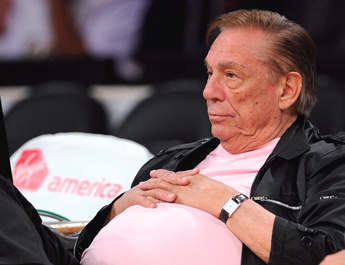
The latest firestorm directed toward Ms. Sterling came after a conversation with V. Stiviano, his much younger girlfriend, was leaked. In it, Mr. Sterling denigrates Blacks and Mexicans, telling her not to post pictures of her with Blacks on Instagram, not to bring Blacks to his game and Earvin “Magic” Johnson, basketball great and business mogul, was not welcome.
Outraged Los Angeles residents rallied across the street from the Staples Center just before the team’s April 29 game to protest. They demonstrated on the 22nd anniversary of the L.A. Rebellion over the acquittal of officers captured on videotape beating of Black motorist Rodney King.
“This is a sad day in the sense that we have been offended again as we have been offended since we’ve been here,” said social and political activist Greg Akili. But it’s a good day because the offender was disciplined swiftly, he said.
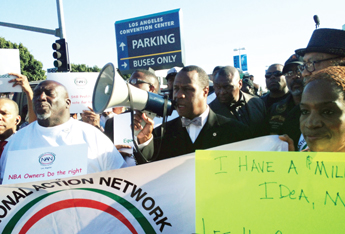
“If you don’t like Black people, if you don’t want me to take pictures with Black people, if you don’t want Black people in the seats, then you don’t want to own a team where 70 percent of the folk who are playing and making you rich are Black. So if we ain’t good enough to be seen with you then we ought to not be able to make you rich either,” Mr. Akili told The Final Call.
The NBA announced Mr. Sterling’s lifetime ban and determination to force him to sell the franchise but that may in itself be a fight.
Is Don Sterling an aberration?
But how did Mr. Sterling fly under the radar, become and remain an owner for so long with such a prevailing attitude that didn’t just show up today? asked Western Region Student Minister Muhammad of the Nation of Islam.
“This man has been like this for a very, very long time so the question is–Is there a good ole boy network system within the owners of NBA who have tolerated this and they did not stand up?” he asked.
“This is a textbook case of what the Nation of Islam gave you in two volumes. This is the exposure of ‘The Secret Relationship Between Blacks and Jews,’ said Dr. Ava Muhammad, national spokesperson for Minister Farrakhan and Nation of Islam attorney during a May 4 keynote address at Mosque Maryam in Chicago.
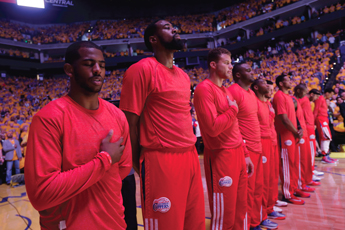
She argued the NBA has long known of Mr. Sterling’s attitudes and actions and recent revelations are just the tip of the iceberg. His history includes a settlement with the federal government for housing discrimination against Blacks and Latinos and a lawsuit filed by basketball great Elgin Baylor, who worked as an executive for the Clippers and accused Mr. Sterling of racism and bringing women into locker rooms to ogle nude Black players.
“Black people better not go in there,” shouted Jerry Karr as the Clippers games was about to begin and crowds moved toward the basketball arena. “Once I saw this stuff on TV, I had to go get my sign and come down here. Basketball is not bigger than my dignity. I’m sorry! And we have to put pressure on these players,” Mr. Carr said. “They’re still going to get their check but they need to sit down! They don’t need to be in their, running up and down no court, chasing a ball after this man called them a slave.”
Accountability rests on everyone, the NBA, the athletes and the community ill-affected by Mr. Sterling’s words, money and power, which enables him to carry out his hatred, Min. Muhammad said.
Mr. Karr felt like many that players should have walked out and Black leaders should have spoken up. “But he’s breaking them off money. We ain’t calling nobody to attention. It’s time for our leaders to start doing right by the people they’re supposed to be representing and that is us,” Mr. Karr said. He was referring to revelations that the Los Angeles Branch of the NAACP was about to give Mr. Sterling a second Lifetime Achievement Award.
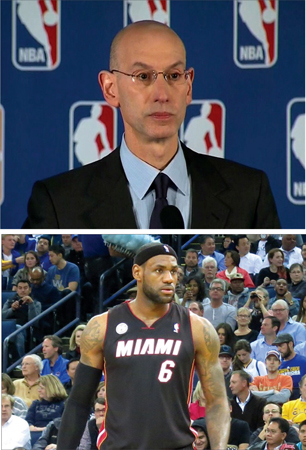
Leon Jenkins resigned as branch president on May 1 under heavy scrutiny from the Black community and an online petition seeking suspension of the L.A. branch altogether.
At an April 28 press conference, Mr. Jenkins explained the branch was awarding Mr. Sterling for his work with minorities and contributions to minority organizations including the NAACP. But Mr. Sterling’s unnamed donation would be returned, Mr. Jenkins said.
“Everybody got their hand in the cookie jar … I’m sick of this stuff,” Mr. Karr shouted angrily.
Issuing a stern message to Black leaders from Minister Farrakhan, Min. Tony stated, “This is no play hour. This is a serious hour and I want to warn everyone that God is angry with the condition of Black and oppressed people here in L.A. and all over the world,” he said.
Blacks in America may not own gold mines, oil fields, or diamond mines, but Blacks do have talent, which is their wealth, Min. Muhammad stated. The days of Blacks suffering on a modern-day plantation are nearing an end, he said.
He continued, “The Honorable Minister Louis Farrakhan said for me to warn any Black leader who goes and have a secret meeting with your hat in your hand, begging for the crumbs that fall off the rich man’s table, we will not be like the Lazarus of the Bible.”
He also encouraged Black athletes. “We love what you attempted to do. You’ve got power. Now it’s time for the Black athletes, and the Black entertainers and the Black community, you’ve got to represent us in a more powerful way.”
He called on NBA Commissioner Adam Silver to meet transparently with the Black community.
Min. Muhammad continued, “God has given us a lifeline. This has happened either by his active will or permissive will and we don’t just want forgiveness, we want the Eight Steps of Atonement to take place here.”
According to Min. Muhammad, Don Sterling and 18 other NBA owners are Jewish. Where do these owners stand? he asked. “If one of us would make an anti-Semitic remark, they would march our leaders in front of the cameras and force him to repent, to ask forgiveness and then still crush him. Well, we want the same thing from their community. Where is the ADL? Where is the Simon Wiesenthal Center? We need to know where you stand on this racist, this hater, this anti-Black man,” Min. Muhammad said.
Sports part of continued Black struggle
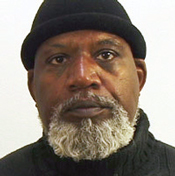
Dr. Harry Edwards, professor emeritus of Sociology at the University of California at Berkeley, put the incident in the context of achieving the American promise.
The challenge is diverse and dynamic, so the perpetual struggle, which includes sports, has to be multifaceted, Dr. Edwards said. “There are no easy victories,” said the lead organizer for the Olympic Project for Human Rights, developed in 1968 to use the international spotlight of the Olympics to highlight race problems. At those Olympic Games in Mexico City, athletes John Carlos and Tommie Smith stood on the Olympic platform after winning medals in the men’s 200 meter race, bowed their heads and stood with Black Power gloved fists in the air.
“We have an African-American family in the White House. That was not a final victory. You only need to look at how President Obama is treated by members of the Congress in high positions and by various other sectors of American society to understand that,” Dr. Edwards stated.
Every generation, whether Jackie Robinson’s, Bill Russell and Jim Brown’s, Tommie Smith and John Carlos’s, Arthur Ashe’s, Muhammad Ali’s or today’s has to take its place in battling in this struggle, he continued.
The athletes “wanted to take a stand against that plantation model of ownership, that he had imposed ownership, and that he rationalized and justified in a conversation that became public and undeniable,” Dr. Edwards said. But while they wanted Mr. Sterling out, they didn’t want to derail the entire train, unless the league, namely the new commissioner and the owners, determined that they were going to give Donald Sterling yet another pass, he said.
“Under those circumstances the players apparently were prepared to boycott not just the rest of the playoffs, but the upcoming season as long as Donald Sterling is in place and we’re still not passed that option,” Dr. Edwards noted.
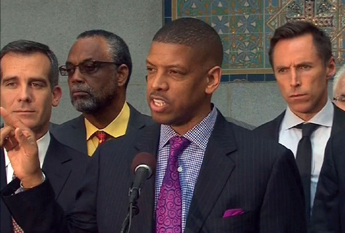
‘Black boys from the South and a White head coach’
The players’ stand was against Mr. Sterling’s body of racist work and reputed actions, which includes charges of the poor treatment of Elgin Baylor, an NBA Hall of Famer.
People have known about Mr. Sterling’s thoughts and actions for a long time but turned a blind eye, said Attorney Alvin Pittman, who represented Mr. Baylor in his unsuccessful 2009 lawsuit against Mr. Sterling.
Mr. Baylor had been a Clippers executive for 22 years (1986-2008) before being fired by Mr. Sterling on the basis of age and race, according to the Baylor lawsuit. He sued on age discrimination but race was an early part of his lawsuit before attorneys strategically dropped the claim, Atty. Pittman said. A jury, however, did not rule in Mr. Baylor’s favor.
“It struck me as validation, confirmation of Elgin’s claims, so it’s confirmation without compensation,” Atty. Pittman said. “Elgin stood alone when he made these claims. All those people who are stepping forward who are saying, ‘Well, we knew all along. We knew he was a racist. We knew this or we knew that,’ they ran from Elgin when Elgin stood making the claim–and when Elgin solicited and sought after support–thinking many of the people that he knew were aware would step forward and be upstanding and supportive of his claims,” Atty. Pittman told The Final Call.
Among Mr. Baylor’s allegations was Mr. Sterling ran a plantation-like operation and had a plantation mentality, Atty. Pittman recalled. “He told Elgin that he would ideally like to have his team composed of poor Black boys from the South, coached by a White head coach … and he told Elgin that these were poor Black boys who he was giving an opportunity to make a lot of money.”
But no matter how much money Blacks make in the NBA as “workers,” they won’t be a “land owner” or permitted to build or invest in wealth they can pass down to their children, argued Dr. Ava Muhammad. While Black ownership would be easy, she encouraged, don’t get excited about somebody Black buying the team. The majority of the power still rests with Whites and a single Black owner doesn’t change an institution, she said.












